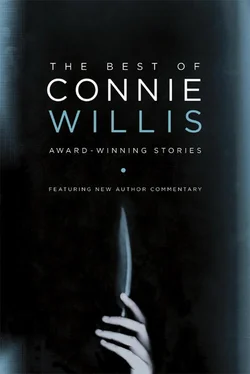Or stayed out of the Tube. I thought of the Old Man saying, “I loathe the Tube.” The Old Man, who had run us merrily all over London on the Tube after adventure, on at Baker Street and off at Tower Hill, up escalators, down stairs, shouting stories over his shoulder the whole time. “Horrible place,” he had said, shuddering, yesterday. “Filthy, smelly, drafty.” Drafty.
He felt the winds, and so did Mrs. Hughes. “I never go down in the Tube anymore,” she had said at dinner. Not “I never take the Tube.” I never go down in the Tube. And it wasn’t just the stairs or the long distances she had to walk. It was the winds, reeking of separation and loss and sorrow.
And Cath had to be right. They had to be the winds of mortality. What else would blow so steadily, so inexorably, on the old and no one else?
But then why had I noticed them? Maybe the conference was an inversion layer of another kind, bringing me face-to-face with old friends and old places. With cancer and the Gap and the Old Man, railing about newfangled plays and spicy food. Bringing me face-to-face early with death and old age and change.
And a feeling of time running out, that made you go shoving down escalators and racing through corridors, frantic to catch the train before it pulled out. A feeling of panic, that it might be the last one. “The doors are closing.”
I thought of Sara, running up out of Leicester Square Station, her hair windblown, her cheeks unnaturally red, of her pushing past my knees in the theater, desperate, pursued.
“Sara felt them,” I said.
“Did she?” Cath said, her voice flat.
I looked at her, standing there against the far wall, braced for the next wind, waiting for it to hit.
It was funny. This very passage, this very station had been used as a shelter during the Blitz. But there weren’t any shelters that could protect you from this kind of raid.
And no matter what train you caught, no matter which line you took, they all went to the same station. Marble Arch. End of the line.
“So what do we do?” I said.
She didn’t answer. She stood there looking at the floor between us as if it had “Mind the Gap” written on it. Mind the Gap.
“I don’t know,” she said finally.
And what had I thought she would say? That it wouldn’t be so bad as long as we had each other? That love conquers all?
That was the whole point, wasn’t it, that it didn’t? That it was no match for divorce and destruction and death? Look at Milford Hughes Senior. Look at Daniel Drecker’s daughter.
“They didn’t have my china at any of the shops in Chelsea,” she said bleakly. “It never occurred to me it might be discontinued. All those years, I—it never occurred to me it wouldn’t still be there.” Her voice broke. “It was such a pretty pattern.”
And the Old Man was so funny and so full of life, the pub was always jam-packed, Sara and Elliott had a great marriage.
But even that couldn’t save them. Divorce and destruction and decay.
And what could anybody do about any of it? Button up your overcoat? Stay aboveground?
But that was the problem, staying aboveground. And somehow getting through the days, knowing the doors were closing and it was all going to go smash. Knowing that everything you ever loved or liked or even thought was pretty was all going to be torn down, burned up, blown away. “Gone with the wind,” I said, thinking of the woman on the train.
“What?” Cath said, still in that numb, hopeless voice.
“The novel,” I said ruefully. “ Gone with the Wind . There was a woman on the train to Balham today reading it. When I was tracking down the winds, trying to find out which stations had them, if they were stations that had been hit during the Blitz.”
“You went to Balham?” she demanded. “Today?”
“And Blackfriars. And Embankment. And Elephant and Castle. I went to the Transport Museum to find which stations had been hit, and then to Monument and Balham, trying to see if they had winds.” I shook my head. “I spent the whole day, trying to figure out the pattern of the— What is it?”
Cath had put her hand up to her mouth as if she were in pain.
“What is it?”
She said, “Sara canceled again today. After you left. I thought maybe we could have lunch.” She looked across at me. “Nobody knew where you were.”
“I didn’t want anybody to know I was running around London chasing winds nobody else could feel,” I said.
“Elliott told me you’d disappeared the day before, too,” she said, and there was still something I wasn’t getting here. “He said he and Arthur wanted you to have lunch with them, but you left.”
“I went back to Holborn, to try to see what was causing the winds. And then to Marble Arch.”
“Sara told me she and Elliott had to go take Evers and his wife sightseeing, that they wanted to see Kew Gardens.”
“Elliott? I thought you said he was at the conference?”
“He was. He said Sara had a doctor’s appointment she’d forgotten about,” she said. “Nobody knew where you were. And then at the theater, you and Sara—”
Had shown up together, late, out of breath, Sara’s cheeks flaming. And the day before, I had lied about lunch, about the afternoon session. To Cath, who could sense when people were lying, who could sense when something was wrong.
“You thought I was the one who was having an affair with Sara,” I said.
She nodded numbly.
“You thought I was having an affair with Sara ?” I said. “How could you think that? I love you.”
“And Sara loved Elliott. People cheat on their spouses, they leave each other. Things…”
“… fall apart,” I murmured.
And the air down here registered it all, trapped it belowground, distilled it into an essence of death and destruction and decay.
Cath was wrong. It was the Blitz after all. And the girl crying on the train to Balham, and the arguing American couple.
Estrangement and disaster and despair. I wondered if it would record this, too, Cath’s fear and our unhappiness, and send it blowing through the tunnels and tracks and passages of the Tube to hit some poor unsuspecting tourist in the face next week. Or fifty years from now.
I looked at Cath, still standing against the opposite wall, impossibly far away.
“I’m not having an affair with Sara,” I said, and Cath leaned weakly against the tiles and started to cry.
“I love you,” I said and crossed the passage in one stride and put my arms around her, and for a moment everything was all right. We were together, and safe. Love conquers all.
But only till the next wind—the results of the X-ray, the call in the middle of the night, the surgeon looking down at his hands, not wanting to tell you the bad news. And we were still down in the tube tunnels, still in its direct path.
“Come on,” I said, and took her arm. I couldn’t protect her from the winds, but I could get her out of the Tube. I could keep her out of the inversion layer. For a few years. Or months. Or minutes.
“Where are we going?” she asked as I propelled her along the passage.
“Up,” I said. “Out.”
“We’re miles from our hotel,” she said.
“We’ll get a taxi,” I said. I led her up the stairs, around a curve, listening as we went for the sound of a train rumbling in, for a tinny voice announcing, “Mind the Gap.”
“We’ll take taxis exclusively from now on,” I said.
Down another passage, down another set of stairs, trying not to hurry, as if hurrying might bring another one on. Through the arch to the escalators. Almost there. Another minute, and I’d have her on the escalator and headed up out of the inversion layer. Out of the wind. Safe for the moment.
Читать дальше












